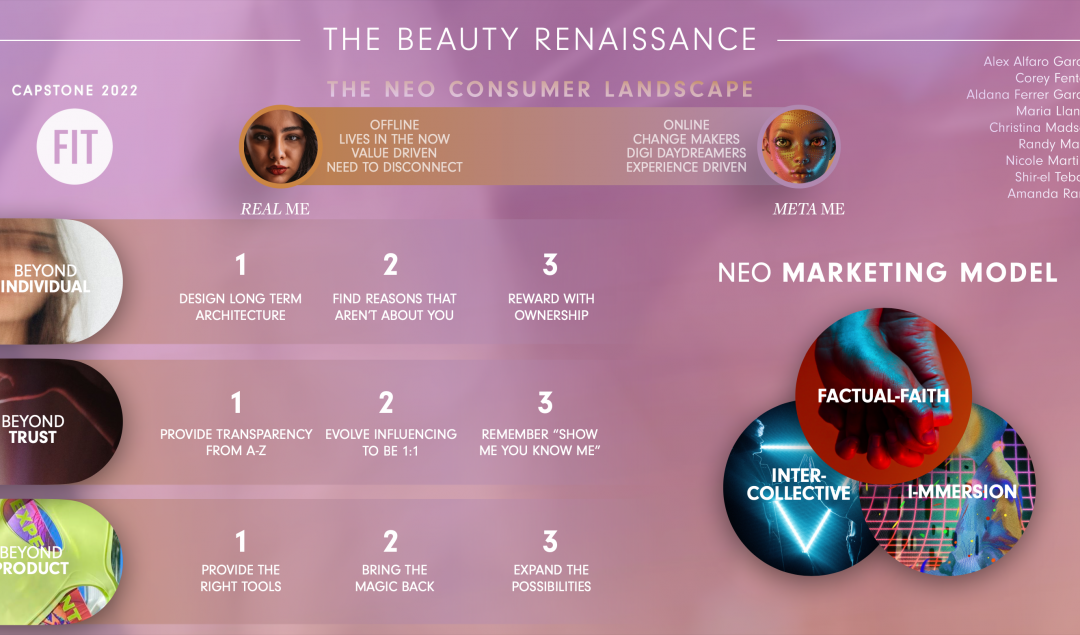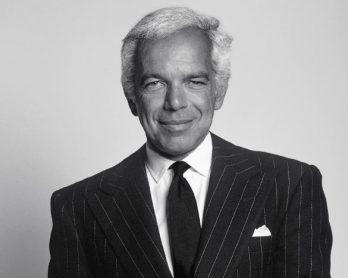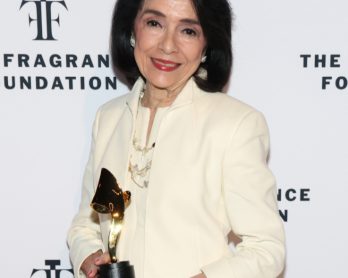FIT Cosmetics & Fragrance Marketing & Management Capstone Research 2022

FIT’s Esteemed Beauty Think Tank Offers Groundbreaking Insights
On Future-Proofing the Beauty Industry Post-Pandemic
FIT Cosmetics & Fragrance Marketing & Management Capstone Research 2022
Beauty After Covid-19: Beauty’s Reformation and Renaissance, a two-part global study conducted by the Fashion Institute of Technology’s “Beauty Think Tank”, examines the paradigm shift within the beauty industry since the pandemic, with the need to adapt to both consumer and employee expectations. The Class of 2022 has delved into research on two critical topics: (1) how beauty organizations can reform internal behaviors to unlock their full potential, execute more dynamic strategies, and thrive in the “new age” of the industry. (2) how emotional tensions and technological advancements have converged to catalyze the rebirth and realignment of the beauty consumer. Together, the cohort completed an in-depth analysis including quantitative and qualitative research inclusive of over 900 respondents, global field work, and interviews with top beauty executives and market experts across the globe.
CFMM Market Opportunity #1: Beauty Reformation
Historically, the Reformation period was an intellectual up-rush, which questioned the motives of authority – helping society break free from structure. Today, the Great Resignation, an unprecedented mass exit from the workforce brought on by COVID-19, has left the industry to reassess its ways of working.
Threats to Organizations: Much of the way we work has remained unchanged since the installation of the 5-day work week in 1926. Now, Covid-19 has sparked four critical, but overlooked, challenges within beauty corporations and their employees:
- Complexity. 53% of industry professionals agree structure and policies often stifle agility and experimentation.
- Burnout. 80% of industry professionals surveyed agree that a five-day work week is an outdated model.
- Turnover. 26% of employees say they only plan to stay with their employer between 0-2 years.
- Rigidity. 71% would look for another job if they weren’t granted the flexibility to work from home. (results sourced by FIT Workplace Survey, 2022)
The C.I.R.C.L.E. Approach: The over-prioritization of two key stakeholders: Consumers and Investors, is hindering industry potential. After extensive research on the ways of working within the beauty industry, FIT’s Beauty Think Tank recommends that beauty organizations come full circle, with the creation of their CIRCLE model. The model is a network, developed with the intention for the beauty industry to form, grow, and work together as a whole. By considering four additional areas of importance, beauty organizations can better navigate post-COVID threats by utilizing these innovative tactics:
- Resources: by creating a Chief Agility Officer position (C.A.O.), building a Central Artificial Intelligence (C.A.I.) hub, and creating a pool of flexible freelancers
- Culture: by defining organizational and personal purpose, fueling DE&I, and offering flexibility of time
- Leadership: by implementing an adaptive “hierarchy,” being mentality changemakers, and re-imagining retention
- Environment: by appealing to new employee needs, leveraging the Metaverse, and embracing fluidity
CFMM Market Opportunity #2: Beauty Renaissance
During the Renaissance, society emerged from the Dark Ages to make exceptional innovations in the arts, architecture, society and culture. Today, we see a similar emergence out of the COVID-19 period’s darkness and are drawing parallels to the beauty consumer.
Covid has Changed Beauty Consumers Forever: Lines are blurring between physical and digital worlds and beauty consumers are facing a complex reality with unlimited ways to interact with brands. Despite excitement around technological advancements and innovation, there is a profound sense of anxiety brought on by the rapid acceleration of society and technology. The consumer research conducted by the cohort uncovered four key insights on the post-COVID beauty consumer:
- Restless and stagnant. In the 18-29 age group, 62% of respondents stated they have feelings of restlessness and lower energy.
- New ways to make connections. 57% of consumers stated that they have changed the way that they find and interact with new people since the pandemic began.
- Consumers don’t trust brands. 66% of survey respondents showed a fear or distrust of companies or brands acquiring and having their data.
- Tech-ceptance is on the horizon. For phygital innovations that bridge the gap between digital and physical, such as virtual try on, the gap between awareness and interest is only 11%. (results sourced by FIT CFMM Consumer Survey, 2022)
The Neo Consumer & Going Beyond: With the evolution of the beauty consumer post-COVID, and considering their anxieties, beauty brands must transcend what was. In order to future-proof their businesses, corporations must go beyond current strategy and form deeper, more meaningful relationships with consumers. The cohort suggests that brands adapt the following:
- Neo Consumer Landscape: a fluid spectrum where consumers seamlessly navigate online and offline worlds
○ Real Me: lives in the moment and values meaningful in-person connections, services, and experiences
○ Meta Me: craves new forms of expression and escape as they experiment with new technologies and metaverse worlds
- Transcend what was: brands must go beyond
○ Beyond Individual to an Inter-Collective: inspire consumers to come together and emotionally invest in each other and the brand
○ Beyond Trust to Factual-Faith: grant full transparency into product, process, and progress
○ Beyond Product to I-mmersion: provide tools for consumers to creatively express themselves in an unprescribed way across platforms and worlds
Takeaways
To ensure future success in the beauty industry, corporations must adapt to the changes brought on by the COVID-19 pandemic. Internally, Beauty’s Great Reformation will impact the future of working for all. Consumers, investors, resources, culture, leadership, and environment must be integrated, interconnected and interdependent for organizations to thrive, not survive. The FIT Beauty Think Tank’s C.I.R.C.LE model revolves around the need for corporations to remember that employees are human beings with a well-being to prioritize. As such, the ultimate goal for a successful beauty company of the future will be to reform existing out-dated ideals and practices, and replace them with a human-centered approach. For the beauty consumer, the convergence of emotional tensions and technological advancement has ignited the Post-Covid Beauty Renaissance, creating an urgency for the industry to evolve with the Neo Consumer. Brands must go beyond traditional frameworks to form intercollectives, earn factual faith, and create I-mmersions. These actions come together to form the Neo Marketing Model, a new framework that will guide brands to overcome the challenge of “Thinking Beyond” to fluidly reach the “Real Me” and “Meta Me” personas across the Neo Consumer Landscape.
About FIT & The Beauty Think Tank
FIT, a part of the State University of New York, has been an internationally recognized leader in career education in design, fashion, business, and technology for 75 years. The college offers nearly 50 majors and grants AAS, BFA, BS, MA, MFA, and MPS degrees, preparing students for professional success and leadership in the new creative economy. The FIT Master of Professional Studies (MPS) in Cosmetics and Fragrance Marketing and Management (CFMM) program, one of seven advanced degree programs in FIT’s School of Graduate Studies, was developed in collaboration with industry as a leadership development program for outstanding mid-career executives. Global luxury firms including Chanel, Shiseido, Estée Lauder, L’Oréal and LVMH, and global consumer packaged goods companies including Coty and Unilever, nominate talented emerging executives to participate in the two-year program. The CFMM program has become the beauty industry’s recognized think tank, producing high-level research presented to industry executives and organizations, and during specialized panels, symposia, and forums in both academia and industry. Visit fitnyc.edu/cfmm. For more information on FIT visit fitnyc.edu.
This year, the research was sponsored by Cosmoprof North America, the leading B2B trade show in the Americas, who regularly host the students to present their research to industry.





